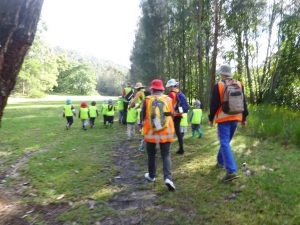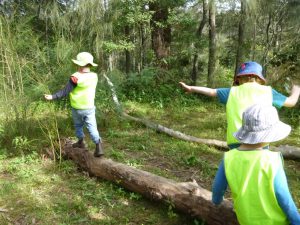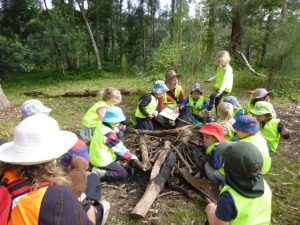Lyrebird Preschool Bush Program
Earlier this year I observed our staff becoming more and more interested in sharing stories and resources about nature schools and forest schools in Australia and overseas. This pattern of interest got us talking at a staff meeting about whether we could incorporate the outdoors even more in our program. We are already very lucky with a natural and bushy playground that allows the children to explore, but we wanted to take it one step further.
We were also noticing a big increase in the number of children at our preschool with high levels of anxiety and behaviour issues. As a group, we began extending our reading on how taking children outdoors can help improve their mental health, just as it does with adults.
I had in the past worked with Amanda Lloyd, a primary school teacher who now runs Outdoor Connections for children in our area of the South Coast of NSW. I started a conversation with Amanda: could she and Penny Sadubin at Outdoor Connections support Lyrebird if we wanted to put together a program that not only enabled the children but also helped our staff to put their great ideas into action?
We shared stories about our visions, discussed locations, and considered the barriers. Pretty soon we had a plan that helped us identify everything we needed to do to get us over the line.
Getting there
 We chose Depot Farm for our bush play location
We chose Depot Farm for our bush play location
We decided on a location at Depot Farm, which is part of Bens Walk along the beautiful Shoalhaven river. It was out of the way of any development and had lovely big open spaces amongst a bushy background. Penny and Amanda met with Karen, our educational leader, and me at the site to do our risk assessment and explore the area for play possibilities. It was perfect!
Although the organisation and planning had its tedious moments, it has definitely all been worth it. We created a five week pilot program, where each week we took two groups of 20 children down to Depot Farm by bus, a 10 minute drive. To manage our numbers we send one group for three hours in the morning then the second group over for an afternoon session. We have alternated the two groups each week so they experience both morning and afternoon sessions.
How it changed the children
The benefits we have seen are absolutely amazing.
For a start, the improvement in the children’s gross motor skills over the weeks has been really strong. During bush walks children are so much more confident navigating the climb and stepping over large rocks and logs.
 The children’s gross motor confidence improved
The children’s gross motor confidence improved
There is far more risk taking and we are seeing children overcoming nervousness. Our third week was very wet and it rained non-stop for two days before our bush trip. One little girl was very hesitant to go into the puddles even with her gumboots on, she stood on the edge watching the other children for about the first hour and just dabbling in the mud on the side. However, her confidence grew as the day went on and she watched her peers. By the end of the session she was wet up to her waist and had been jumping and falling into the puddles.
One of the rules Penny and Amanda set was if the stick is bigger than you, you need a helper to carry it. This rule the children really took on board, telling each other: ‘You need a friend to help!’ We saw children working together and supporting one another to lift heavy sticks and branches as they moved them to make shelters and camp fires.
 They worked together to achieve outcomes
They worked together to achieve outcomes
The need to support each other meant that children made connections with different peers than they would normally play with at the preschool. The friendship dynamics changed remarkably.
We noticed that typically quiet, timid children were now chatting and talking throughout the program, being far more social and continuing that increased confidence when they got back to preschool. It has given the children the opportunity to make new friendships and make new bonds with the teachers.
How it changed us
This program has even seen a change in staff and parents.
In the first week some of our team were reluctant about risks and unsure how far to let the children go. As the weeks went on though, we all felt far more confidence and willingness to let the children really connect with the outdoors: dirt, sticks, rocks, fire, mud and all!
The parent participation has also been wonderful. We have had parents with us every session and they have actively participated in getting out and learning with the children. Some of the more wary parents – who perhaps chose to attend because they were concerned about dangers – have also embraced the program and are much more relaxed with the thought of the children leaving the boundaries of preschool.
Being a preschool with a large Aboriginal presence we have also been able to enjoy contributions from parents sharing the cultural side of the bush play. One father attended to explain to the children the significance of different plants and relationship to the area for local Aboriginal tribes.
Where to now?
We are excited for where our adventures will take us next.
We want to extend the program to allow more children at the preschool to experience regular bush play. We have talked about the possibilities of extending our program to local farms as we have many farming families in the community. We envisage a series of visits to big properties where we combine farm animal and crop experiences connections to our local Aboriginal elders who can leading us down cultural paths.
Major benefits for the children
- Major improvement in gross motor skills
- Far more risk taking
- Working together to achieve outcomes they could not do alone
- Variations in friendship dynamics
- Overcoming timidity and being more social
Related stories
About CELA
Community Early Learning Australia is a not for profit organisation with a focus on amplifying the value of early learning for every child across Australia - representing our members and uniting our sector as a force for quality education and care.